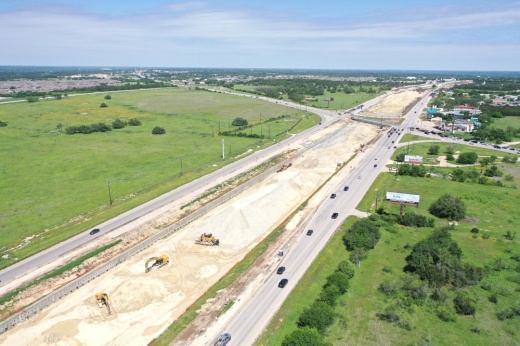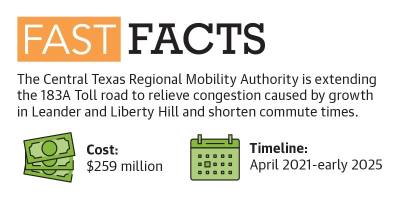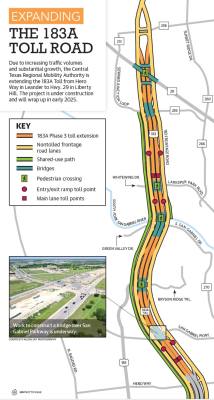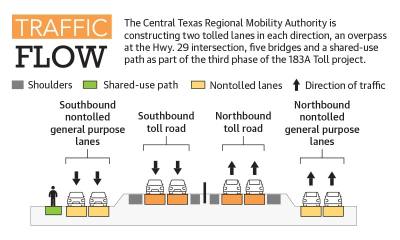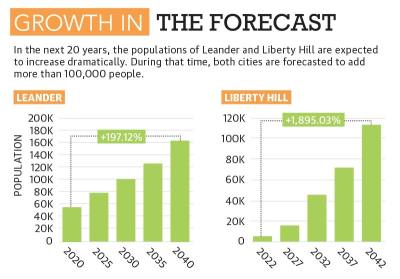Stretching from Hero Way in Leander to Hwy. 29 in Liberty Hill, the 5.3-mile extension will be built within the US 183 median between two existing frontage roads. It will consist of two tolled southbound and northbound lanes as well as a 7-mile, 10-foot shared-use path. Work on the $259 million project began in 2021, and it is on time to reach completion in 2025.
Once completed, the toll road is expected to save commuters time by eliminating four signalized intersections at San Gabriel Parkway, Bryson Ridge Trail, Whitewing Drive/Larkspur Park Boulevard and Hwy. 29.
“It is going to be a huge traffic reliever for the folks that commute south,” Williamson County Commissioner Cynthia Long said.
The project will maintain the existing frontage roads, keeping two nontolled lanes in each direction, Central Texas Regional Mobility Authority officials said. The work currently taking place in the project boundaries includes tunneling underground to build the extended 183A underneath Hwy. 29; beginning construction on the new Hwy. 29 overpasses over 183A; erecting retaining walls; and installing drainage systems and utilities.
This extension is the third phase of the 183A Toll project. The Mobility Authority is expanding the toll road north as the population in Liberty Hill is expected to grow to 112,420 by 2042 and Leander to 163,414 by 2040, according to the cities’ data.
“It’s unbelievable growth, and [US] 183 is our main thoroughfare, so everyone is going to be dumping onto that,” said Kat Howell, a long-term Leander resident and town historian. “Expanding that direction is an absolute must.”
Mapping it out
In March 2007, Phase 1 of the 183A Toll project system from RM 620 to RM 1431 was completed. The 5-mile Phase 2 extension from Cedar Park to Hero Way in Leander opened in April 2012.
“The first plans for [183A] were put on the map in 1985. ... It took 22 years to get to that first phase,” Long said. “The second phase was completed six or seven years ahead of schedule because of the demand.”
Since the 183A project began, substantial commercial and residential growth has occurred along that corridor, said Mike Sexton, acting director of engineering at the Mobility Authority.
On US 183 near the San Gabriel River in Leander, traffic volumes were 18,400 a day in 2011, according to Texas Department of Transportation data. This number increased to 40,209 cars a day in 2021, a 118.5% jump.
A Mobility Authority environmental study determined the average annual daily traffic projections for the third phase of the 183A toll system.
On 183A from Hero Way to Bryson Ridge Trail, traffic is predicted to increase from 22,200 vehicles per day in 2016 to 64,800 in 2042. From Bryson Ridge Trail to Hwy. 29, it’s projected to increase from 33,800 to 92,300 during the same timeframe.
“Any improvements that can and will be done to ... [US] 183 will help hopefully alleviate some of that traffic,” Liberty Hill City Administrator Paul Brandenburg said.
Liberty Hill Director of Planning Jerry Millard said he foresees increased economic development happening as a result of the new toll road.
“You have a high-traffic corridor; I think that’s what businesses are looking for,” he said.
From 2007-18, property values along the 183A Toll grew by more than $1.2 billion, a 171% increase, according to Mobility Authority data. Additionally, sales taxes collected within a half mile of 183A increased by 137% from 2010-17 to $2.9 million.
Leander Economic Development Director Randall Malik said having frontage roads allows the city better access to development tracts right off 183A, which attracts developers.
“We believe that the completion of the project ... is going to fast track the type of developments our peer cities such as Georgetown, Round Rock, Cedar Park all benefit from with their completed infrastructure,” Leander City Manager Rick Beverlin said.
The latest extension
The Mobility Authority is conducting construction along the entire length of the new extension simultaneously.
Drill shafts and bridge columns are nearly complete, Mobility Authority officials said, and the remaining work includes building retaining walls and placing bridge beams. Five bridges carrying 183A and one overpass will be built along the 5.3-mile extension.
Hwy. 29 is the only intersection that will allow the extended 183A tolled lanes to travel under a new bridge at Hwy. 29. Tunneling work is being conducted to allow for this.
Work on a new pedestrian bridge over the San Gabriel River has started, but construction on the shared-use path spanning from Hero Way to Seward Junction Loop remains to be done.
Sexton said because the toll road is being built between two existing frontage roads, a lot of the impacts of the work are minimized.
In the months prior to opening the extension, the Mobility Authority will determine toll rates based on factors such as demand and the agency’s financial obligations for construction and maintenance of the road.
Williamson County has spoken to the Mobility Authority about the possibility of an additional extension, should the growth in the area continue.
While Sexton said the agency does not have plans to extend the 183A corridor right now, the Mobility Authority will monitor the growth to see if it justifies more construction in the future.
“Transportation planning is a marathon, not a sprint; it is sometimes 20-plus years from the time you plan something until you actually start construction on it,” Long said. “Getting those plans in place as soon as we can is vital if we want to be prepared for the future.”




